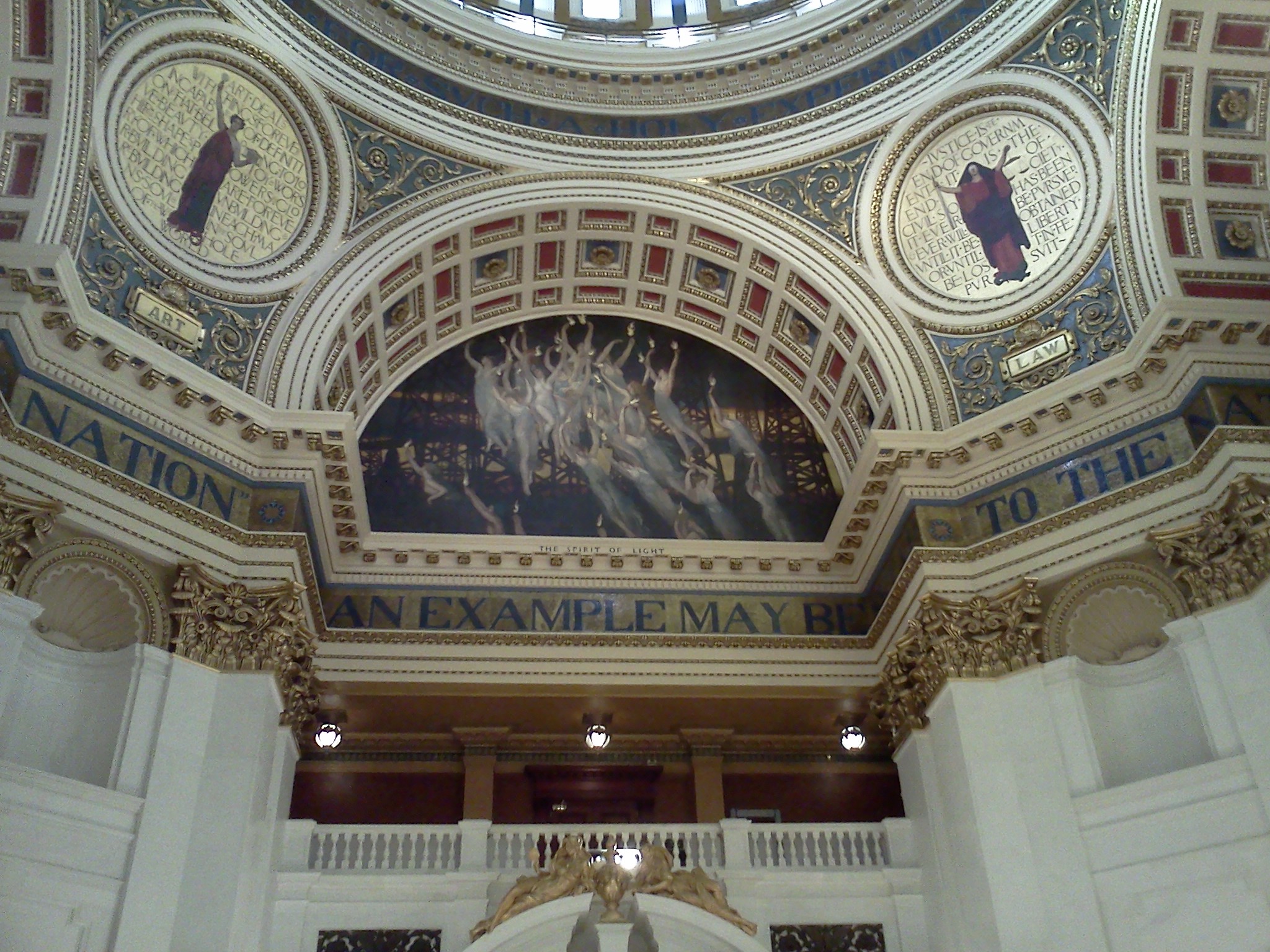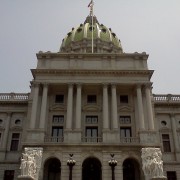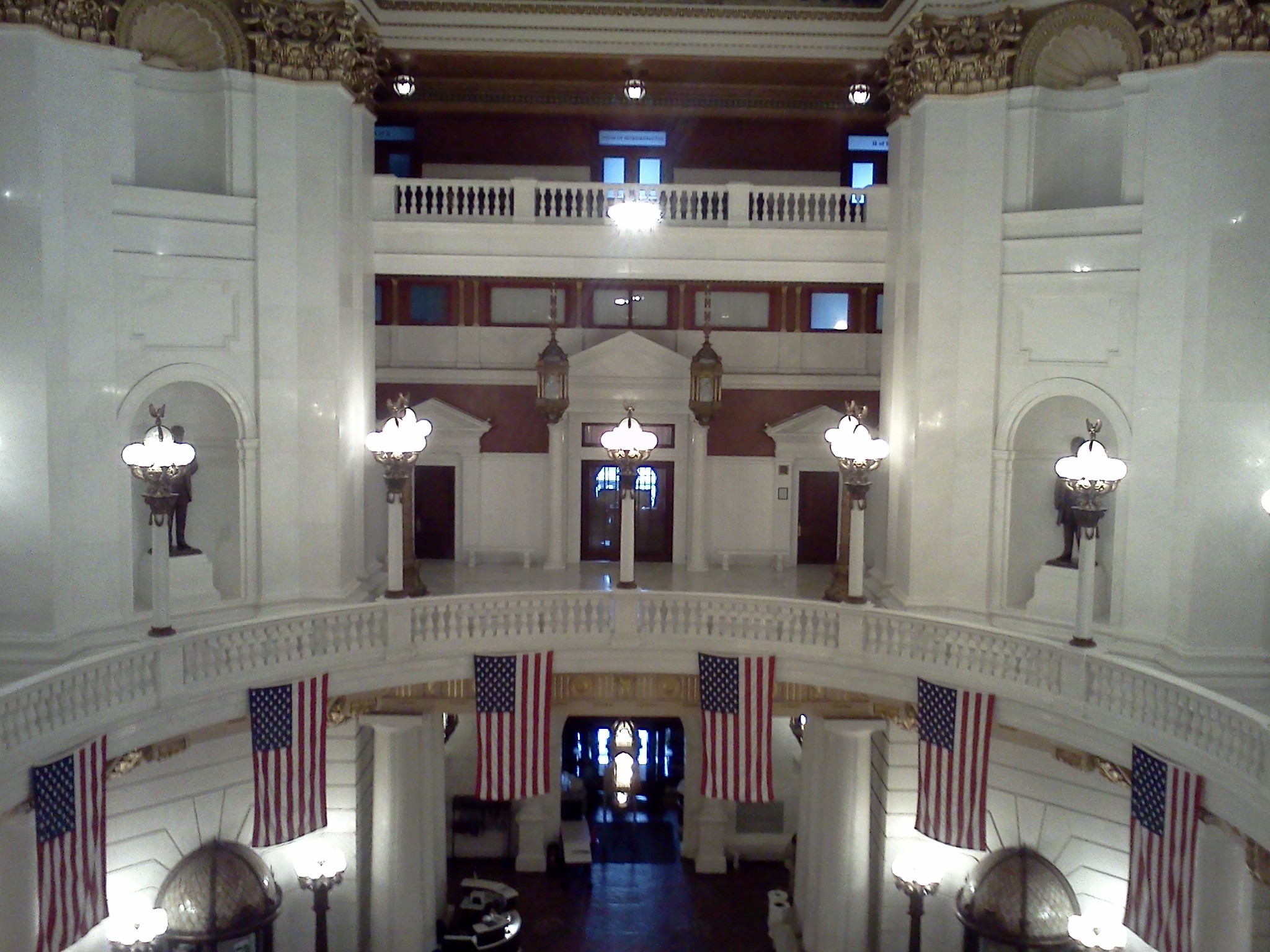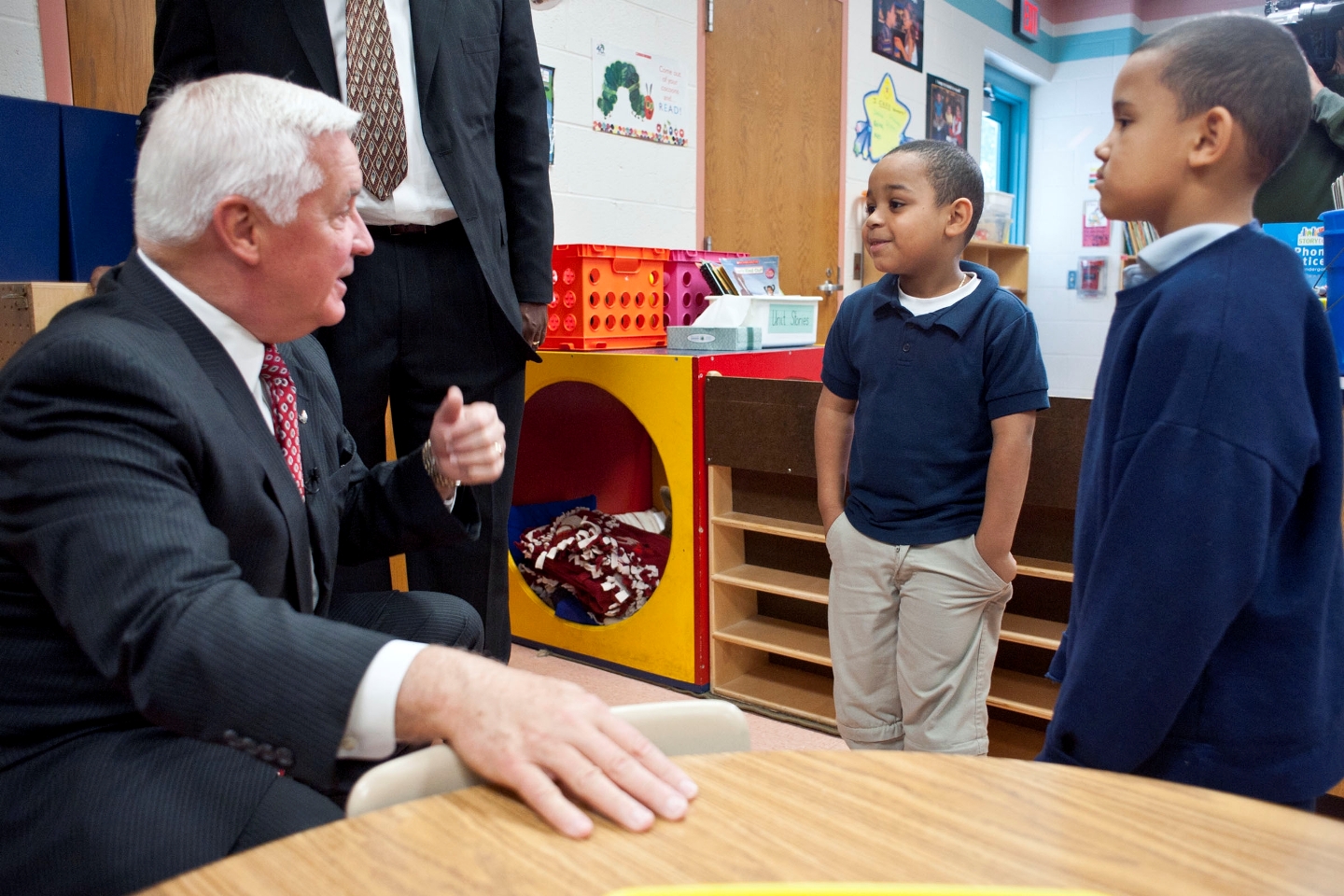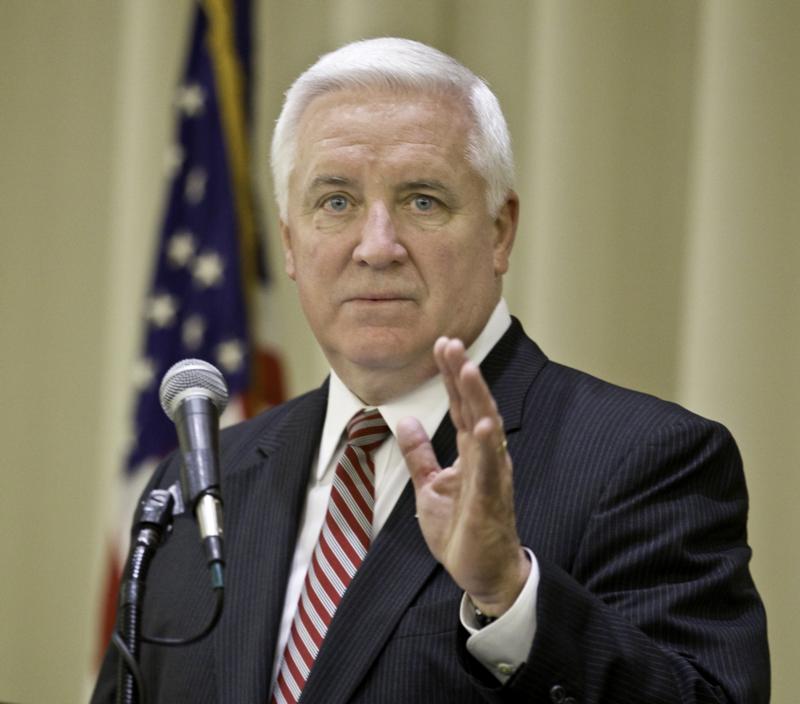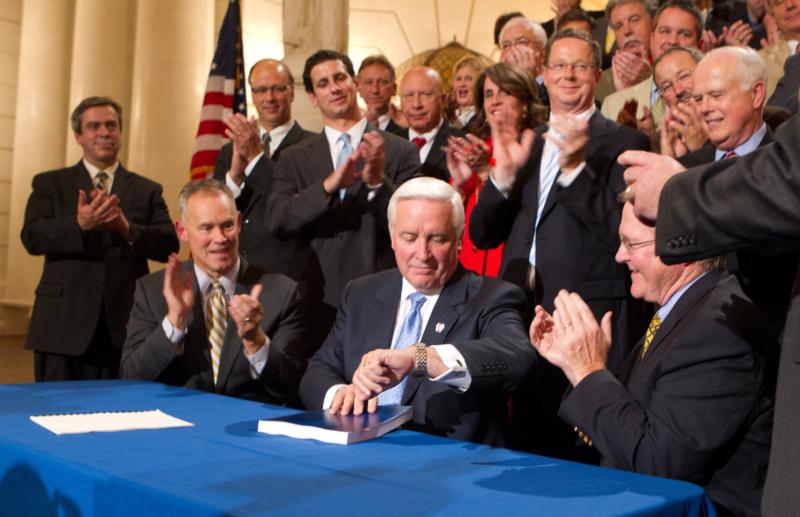Posts
State Rep. Puts School Districts on Notice
/in News /by PAMattersDepartment of Education data show Pennsylvania school districts had a combined $3.2-billion dollars in reserve funds as of the end of last school year. Taxpayers deserve an explanation, according to State Rep. Mike Vereb (R-Montgomery). “The people on these school boards that are holding on to these pots of money need to come clean with the taxpayers that they are about to jump into their pockets and raid one more time,” Vereb said at a capitol news conference on Monday.
Vereb rattled off a list of the districts with the most cash in the bank. He says it’s ludicrous for school districts to propose property tax hikes and point their fingers at Harrisburg while holding onto vast reserves.
But much of the money represents school districts’ attempts to help smooth out the looming pension spikes that are legislatively mandated, according Dave Davare, director of research services at the Pennsylvania School Boards Association (PSBA).
Speaking to Radio PA Davare rattled off his own list of school districts that are, in fact, tapping their reserve funds in order to balance FY 2013 budgets. The PSBA advises school districts to use reserve funds as one-time revenue streams for one-time expenses. “When a district uses its fund balance to pay for teachers’ salaries so they don’t have to lay off teachers this year, that just means next year when they don’t have that fund balance, they’re going to have to lay off teachers at that point,” Davare explains.
Rep. Vereb says the rule of thumb is that schools’ reserve funds should be 5 -7% of their operating budgets. He’s looking into possible legislative action.
Committee Vets Teacher Evaluation Bill
/in News /by PAMatters
Under the state’s current evaluation system, teachers fall into one of two categories: satisfactory or unsatisfactory. 99.4% of teachers currently receive a satisfactory rating, and overhauling the system is one of the Corbett administration’s top education reform priorities. “The success in meeting the mission of our public education system, ensuring that all children reach academic achievement, is dependent upon the quality of the teacher,” Education Secretary Ron Tomalis said in his testimony before the House Education Committee.
Legislation has been introduced in response to the teacher evaluation plan that Governor Corbett laid out, last month, in York. State Rep. Ryan Aument’s HB 1980 would base half of a teacher’s evaluation score on student achievement. It would also expand the current rating system to include four categories: distinguished, proficient, needs improvement or fails.
A variety of stakeholders had their say at Thursday’s Education Committee hearing, including the state’s largest teachers union. “Using standardized tests as 50% or more of a teacher’s evaluation will not produce evidence of teacher effectiveness that is strong or fair,” said Pennsylvania State Education Association board member Linda Cook. She does say, however, that PSEA wants to improve the current system in other ways.
The Pennsylvania School Boards Association supports the development of the new teacher evaluation standards, but raised concerns with the proposed timeline. “Being forced to move according to the deadlines set in legislation could inadvertently undermine the system that [the Pennsylvania Department of Education] has moved so methodically to create,” said Kathy Swope, President of the Lewisburg Area School Board, who testified on behalf of the PSBA.
The Corbett administration wants the new teacher evaluation framework in place for the next school year. HB 1980 currently awaits committee action.
Vouchers: The Most Controversial of the Education Reforms
/in News /by PAMattersSchool choice is not a new issue in PA, and it was no surprise when Governor Corbett included school vouchers in his education reform agenda. In fact, several protesters gathered in York in anticipation of what they were about to hear. “65% of Pennsylvanians do not support using public money to pay private school tuition and only 11% of Pennsylvanians strongly support a voucher program,” says Cumberland County parent Susan Spicka. “If the majority of Pennsylvanians do not support vouchers, I don’t know why he does.” Spicka was citing a recent poll released by the Pennsylvania School Boards Association (PSBA).
The Corbett plan calls for opportunity scholarships to be made available to low-income students in the worst performing 5% of schools. The Opportunity Scholarship Program would allow eligible students to use state tax dollars to help pay tuition at the public or private school of their choice. “What moves to the new school is the state subsidy, the old school still keeps its taxes in their school district,” Corbett says. Students whose families earn 130% of the federal poverty level would be eligible for the full scholarship. “To give that to you in dollars and cents,” Corbett says, “That’s a family of four earning $29,000.” Students whose families earn 185% of the federal poverty level would be eligible for 75% of the scholarships.
Opponents say vouchers don’t work. “Vouchers, as proposed, would still leave a large number of students in those underperforming buildings,” says PSBA Director of Research Services, David Davare, who released a new research paper touting alternatives to raise student achievement in underperforming schools.
“The issue is not that vouchers don’t work, the issue is the current system doesn’t work,” says Otto Banks, executive director of the REACH Alliance & Foundation, who says many students are trapped in failing schools simply because of their ZIP code. “Vouchers are simply a means to an end,” Banks tells Radio PA. “It gives a child an opportunity, or access to a quality education.” REACH strongly supports the governors’ education reform agenda.
Education Agenda Reaction Runs the Gamut
/in News /by PAMattersSome are noting a lack of detail in the governor’s education reform speech, but the state’s largest teachers union doesn’t need specifics to oppose the advent of school vouchers in Pennsylvania. “The bottom line for us on any voucher program is that they don’t work, they don’t raise student achievement,” says Pennsylvania State Education Association (PSEA) spokesman Wythe Keever. He says the state should be focusing on initiatives that do work, such as tutoring, full-day kindergarten and smaller class sizes.
The Pennsylvania School Boards Association (PSBA) adds that vouchers are unaffordable at a time when public education funding has already been cut by $900-million. “Across all demographic groups, the public is just not interested in spending tax dollars to send children to private schools,” says PSBA executive director Tom Gentzel. He points to the latest survey – conducted by Terry Madonna Opinion Research – that found 65% of Pennsylvanians either strongly or somewhat oppose vouchers.
But, Gentzel does tell us there are parts of the governor’s agenda that are worth discussing. He says charter school accountability measures are long overdue. Likewise, the PSEA isn’t deriding the entire plan. “PSEA agrees with the governor that teacher evaluations need to be improved, and we support the use of multiple objective measures of performance,” says the PSEA’s Wythe Keever, who’s interested in the results of the new teacher evaluation pilot program.
Governor Corbett’s agenda appears to have some bicameral support in the General Assembly, based on the high-ranking cast of Republican lawmakers who stood by his side at the Lincoln Charter School in York. “What the governor is putting on the table are very tangible proposals that allow us to move Pennsylvania into the forefront of reform,” says House Majority Leader Mike Turzai (R-Allegheny). “Our economy in the 21st century is going to look for excellence,” says Senate Majority Whip Pat Browne (R-Northampton). “Through the reforms the governor is advocating for, we will be pursuing excellence here in Pennsylvania.” Governor Corbett wants lawmakers to act in the next few months, so that the reforms he outlined on Tuesday can be in place for the start of the 2012-2013 school year.
Governor Tom Corbett Defends Education Budget
/in News /by PAMattersThe new state budget has been in place for about two weeks now, but its impact on public schools is still being sorted out. “We don’t know yet how many teachers wound up being furloughed, and how many program cuts, so we’re trying to gather that information,” says Tom Gentzel, executive director of the Pennsylvania School Boards Association (PSBA).
Governor Tom Corbett points out that state education funding has actually increased. “When it comes to the basic education formula, we actually increased it over the 2008/2009 level,” Corbett said on Radio PA’s monthly “Ask the Governor” program. He places blame on the prior administration for cutting school funding from the state, only to back-fill with federal stimulus money. “That money is gone,” Corbett concluded.
By balancing their budgets with federal stimulus money, Corbett says many school districts set themselves up to fall off this funding cliff. At least one school district got it right though, according to Corbett. He singled out Northern Lehigh School District on the program. “They did not take the federal money and put it into their basic funding formula. They haven’t laid anybody off, they haven’t cut any classes, they were – in my opinion – responsible in that.”
However, the PSBA’s Tom Gentzel stresses it was the legislature who put the federal money into schools’ regular appropriation. “So this wasn’t just a decision on the part of school districts… it was a part of the state funding for education,” Gentzel explains. He adds that school districts are feeling the pain beyond the basic education funding line item.
When including the federal stimulus money, basic education funding was trimmed by about $400-million dollars (though Governor Corbett was correct when he said the state’s share increased). The Accountability Block Grants, which fund full-day kindergarten programs, were cut by about $150-million dollars. Completely eliminated was the reimbursement of charter schools. That line item received more than $220-million dollars last year.
PA Budget Signing Beats Midnight Deadline
/in News /by PAMattersThe $27.15-billion dollar, no-tax increase budget trims state spending by more than a billion dollars. It passed the legislature with zero Democratic support Wednesday night, but Governor Tom Corbett waited until all of the supporting bills were in place before finally putting pen to paper late Thursday night.
The administration reports that 66-line items were eliminated, 226-line items were reduced, and 52-line items were consolidated. Basic education funding will receive $5.35-billion dollars in the new fiscal year. That’s down from a total of $5.77-billion dollars last year (a number which included federal stimulus dollars). The State System of Higher Education is already responding to 18% funding cuts. Its board of governors approved a 7.5% tuition hike on Thursday. Similarly, the state related universities (PSU, Pitt, Temple and Lincoln) face 19% reductions in state support.
Governor Corbett calls the lean spending plan an important first step in putting PA’s fiscal house back in order. “It spends no more than we have and it doesn’t pretend that we have more that we haven’t budgeted,” Corbett said referring to Democrats’ calls to use last year’s unexpected revenues to mitigate cuts to education and welfare programs.
At Thursday night’s bill signing, Governor Corbett said the budget was crafted to grow PA’s economy: “Make no mistake here. This is a budget for Pennsylvania families, for Pennsylvania working families. It is a budget that imposes no new taxes on them.”
Governor Corbett also hailed legislative passage of a new bill to limit Act 1 exceptions – thus requiring a voter referendum if a PA school district seeks to raise property taxes above the rate of inflation. While it was technically an unrelated bill, it represents a Corbett priority and the final piece of the budget package. “I believe we need to give the citizens of Pennsylvania, in the school districts, the ability to voice their opinion in more than just the election of school board directors,” Corbett tells reporters.
However, the Pennsylvania School Boards Association is concerned that this will result in additional reductions in educational programming. They know that voter referenda on property taxes are extremely difficult to approve. “The problem is, less than 25% of the population has children in schools, so there’s 75% of the population that the districts need to reach that they don’t necessarily reach on a routine basis,” says PSBA director of research Dave Davare. “Districts are not willy-nilly raising taxes,” Davare tells us.
With this year’s budget work behind them, the State House and Senate have each recessed until September. This marked the first time in nine years that PA’s state budget was signed by the constitutional deadline.
Welcome to PAMatters.com, a new source for news and commentary from Pennsylvania’s capital. In addition to video, audio and pictures from the stories and events that affect YOU, you’ll also get some behind-the-scenes analysis via blogs from our award-winning staff of journalists.



